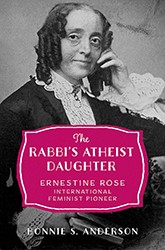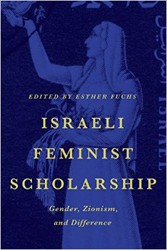
Earlier this week, Bonnie S. Anderson explained why the subject of her book The Rabbi’s Atheist Daughter: Ernestine Rose, International Feminist Pioneer would have been at the front of the Women’s March on Washington this past weekend. Bonnie is guest blogging for the Jewish Book Council all week as part of the Visiting Scribe series here on The ProsenPeople.
Born in 1810 to a Polish rabbi and his wife, Ernestyna Potowska, as she may have been called then — her Hebrew names have been lost to history — was raised as an Orthodox Jew. (Virtually all Jewish families were Orthodox then — the nascent Reform movement was just starting in Berlin.)
Educated by her father, Ernestine was taught skills usually reserved to boys: learning Hebrew and reading Torah. Early on, she began to ask questions, as Jewish boys were supposed to do. “Little girls must not ask questions,” her father declared, a pronouncement that she later said made her “an advocate of religious freedom and women’s rights.” At 12 years old, she tested God’s approval of her community’s stricture that “You must keep the Sabbath unto the breaking of a piece of straw.” When the deity sent no sign to stop her doing this, she “broke with the God of Moses and began her break with any personal God.”
She went through the motions of practicing her religion for a few more years, unwilling to finalize the breach with her father, whom she adored. But in her mid-teens she completely renounced Judaism — and with it, all religious belief. She later argued that to Jews, it was all or nothing; Christians could rotate among various denominations, but for the Jew “there is but one step between his religion and Atheism.” If one “takes one step in advance, he is out of darkness, into the broad light of day.” For the rest of her long life, Ernestine Rose, as she became when she married in 1836, identified as an atheist, lectured ardently for free thought, and repudiated all religions as “superstition.”
But can you ever leave the Tribe? I have written elsewhere in these columns about Rose’s experiences of antisemitism, but here I am interested in how much her Jewish upbringing shaped her adult values. After settling in England in 1831, she found a “new father,” the eminent industrialist-turned-radical Robert Owen. Rose became Own’s “disciple” and embraced his philosophy for the rest of her life. Owen believed that the religion of the “New Moral World” he hoped to create consisted in “promoting the happiness of every man, woman, and child[…] without regard to their class, sect, party, or color.” Rose consistently praised Owen’s patience, benevolence, charity, and kindness and made his ideals her own. The egalitarianism of this philosophy demanded human rights for everyone: “white and black, man and woman,” Rose declared, “humanity’s children are all one and the same family, therefore there should be no slaves among them.” In the United States, she consistently linked women and slaves. “Like or unlike, he [the black man] is a human being, and I will use the same argument with regard to him that I use when pleading — no, not when pleading — when claiming the rights of woman,” she declared in 1855.
Owenite philosophy did away with the Christian concept of Original Sin and refused to blame anyone — not the misogynist nor the slave-owner — since people’s characters and values were formed by the society in which they lived. “An entire change in the character and condition of mankind” can be brought about by “philosophical inquiries into the nature of the causes that produce depravity, vice, and misery,” Rose maintained. Restoring the rights of women and slaves would benefit men and whites as well. It would be “in the interest of all….all are one in the race.” Social and political reform can heal the world.
This ideal consitutes the Jewish ethic of Tikkun Olam, repairing the world. Found in classical rabbinic literature, this concept may have been conveyed to the young Jewish girl during her studies with her father in Poland. Whether in England or America, this ideal motivated Ernestine Rose’s amazing activism, leading her to tour and lecture, to join conventions and sponsor meetings, to write and petition. Throughout her career, she attempted to make the world a better place for women, for slaves, and paradoxically, for non-believers. I believe that even as an outspoken atheist, she remained committed to this basic Jewish precept.
Bonnie S. Anderson taught history and women’s studies at Brooklyn College and the Graduate Center of the City University of New York for over thirty years. A pioneer in the field of women’s history, Anderson lectures throughout Europe and the United States on women’s movements, international feminism, the history of sexuality, and women’s issues today. The Rabbi’s Atheist Daughter: Ernestine Rose, International Feminist Pioneer is her fourth book.



